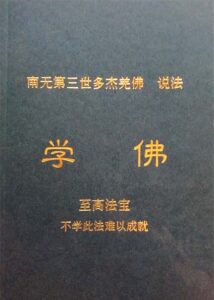Cultivation is a term translated from the Chinese term “xiuxing” to explain an essential part of being a Buddhist. It is part of what a practicing Buddhist does. “Xiu” does mean to cultivate or repair, but “xiuxing” means much more in Chinese. It is the art of practicing perfection, to become a Buddha or perfect one. There is no equivalent word in English, but it involves self-reflection on what you do and what you do to other beings, comparing your behavior to that of a Buddha, and vowing to do better until you can become like a Buddha. All the 84,000 dharma methods of the Buddha are teachings to help us become moral so that we can behave like a Buddha in speech and actions and develop our minds so that we can think like a Buddha and understand the true nature of reality and thus know how to better behave like a Buddha. The Eight-fold Path of the Buddha can be summarized as the “Three Trainings”.
Cultivation & Dharma Practice
The Three Trainings
Morality (Sila or Precepts)
Right Speech, Right Action, Right Livelihood
Concentration (Samadhi)
Right Effort, Right Mindfulness, Right Meditation
Wisdom (Prajna)
Right View and Right Intention or Resolve.
Cultivation is reflecting on and living your life in keeping with these trainings. “Cultivation of Character” involves the morality aspect of these trainings, while “Cultivation of the Mind” involves developing the second, our concentration, and wisdom is the result of the first two and also what is required to further develop them. Cultivation can also be thought of as developing the Buddhist resources you need to progress on your path to enlightenment.
Dharma practice is the specific techniques that one uses to help achieve this. The Buddha taught 84,000 different methods to match the 84,000 afflictions and character flaws of living beings. Many of these methods still exist in the world today, and may involve chanting certain mantras or scriptures, visualization, various forms of meditation, etc. At Learning from Buddha College and Seminary, we strive to promote and encourage followers of all sects within Buddhism from the Theravada, Mahayana, or Vajrayana traditions as well as non-Buddhists who sincerely cultivate themselves to become more virtuous and holy beings by practicing morality and concentration (meditation) and thus developing their wisdom.
Students enrolled in the Xiuxing Seminary or following the Xiuxing Practice Programs at LFBCS are expected to have a daily dharma practice and maintain a journal of the time spent in such practice and their achievements and to share this with their spiritual mentors. Those enrolled in the Buddhist Studies Program or as Auditing Students may do so as well, but it is not a requirement.

The Learning from Buddha College and Seminary have been offering seminars on these discourses and can now offer DCB35-Learning from Buddha, an online course as the book is now available online in English.
